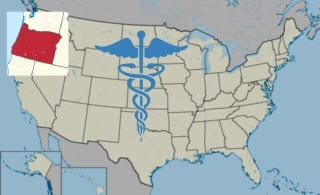Federal government may take control of Cover Oregon in order to fix it
 The federal government is preparing to take over the health insurance exchange of Oregon. Cover Oregon is one of the few state-operated exchanges currently in existence in the U.S., as most states have opted to allow the federal government to manage their exchanges. Federal exchanges have experienced major technical problems that have made it difficult for people throughout the country to sign up for insurance coverage, but some state-run exchanges have managed to avoid these problems. This is not the case for Cover Oregon, however, which is often referred to as being “broken.”
The federal government is preparing to take over the health insurance exchange of Oregon. Cover Oregon is one of the few state-operated exchanges currently in existence in the U.S., as most states have opted to allow the federal government to manage their exchanges. Federal exchanges have experienced major technical problems that have made it difficult for people throughout the country to sign up for insurance coverage, but some state-run exchanges have managed to avoid these problems. This is not the case for Cover Oregon, however, which is often referred to as being “broken.”
Policies sold through Cover Oregon will still be active if exchange is closed
The executive board is charge of overseeing Cover Oregon is scheduled to vote on whether or not the federal government will be able to take control of the exchange. If the exchange is taken over, it will be shut down entirely for a certain period of time as the federal government works to resolve its issues. The policies sold through the exchange will remain active, of course, as the exchange operates as a marketplace and not as an insurance provider. These policies will continue to be managed by the insurers that have provided them.
Other states have also been experiencing problems with their own exchanges
Cover Oregon is not the only exchange that has caught the eye of the federal government. The government has been working on addressing the issues of state-run exchanges that have not managed to meet their enrollment goals. Exchanges in Maryland and Massachusetts are also being scrutinized by the federal government, which may move to take over these exchanges at some point in the future. Earlier this month, Maryland’s insurance exchange became the first in the country to opt to completely replace the technology that had been used to form the exchange.
States where exchanges have been successful may become exemplars
California, Connecticut, and Kentucky have opted to manage their own health insurance exchanges and have managed to find significant success in doing so. These states have avoided many of the technical problems that have crippled other exchanges and have led successful marketing campaigns that helped boost enrollment numbers over the past several months. These exchanges may likely serve as examples as the federal government begins reforming faltering exchanges in some states.
